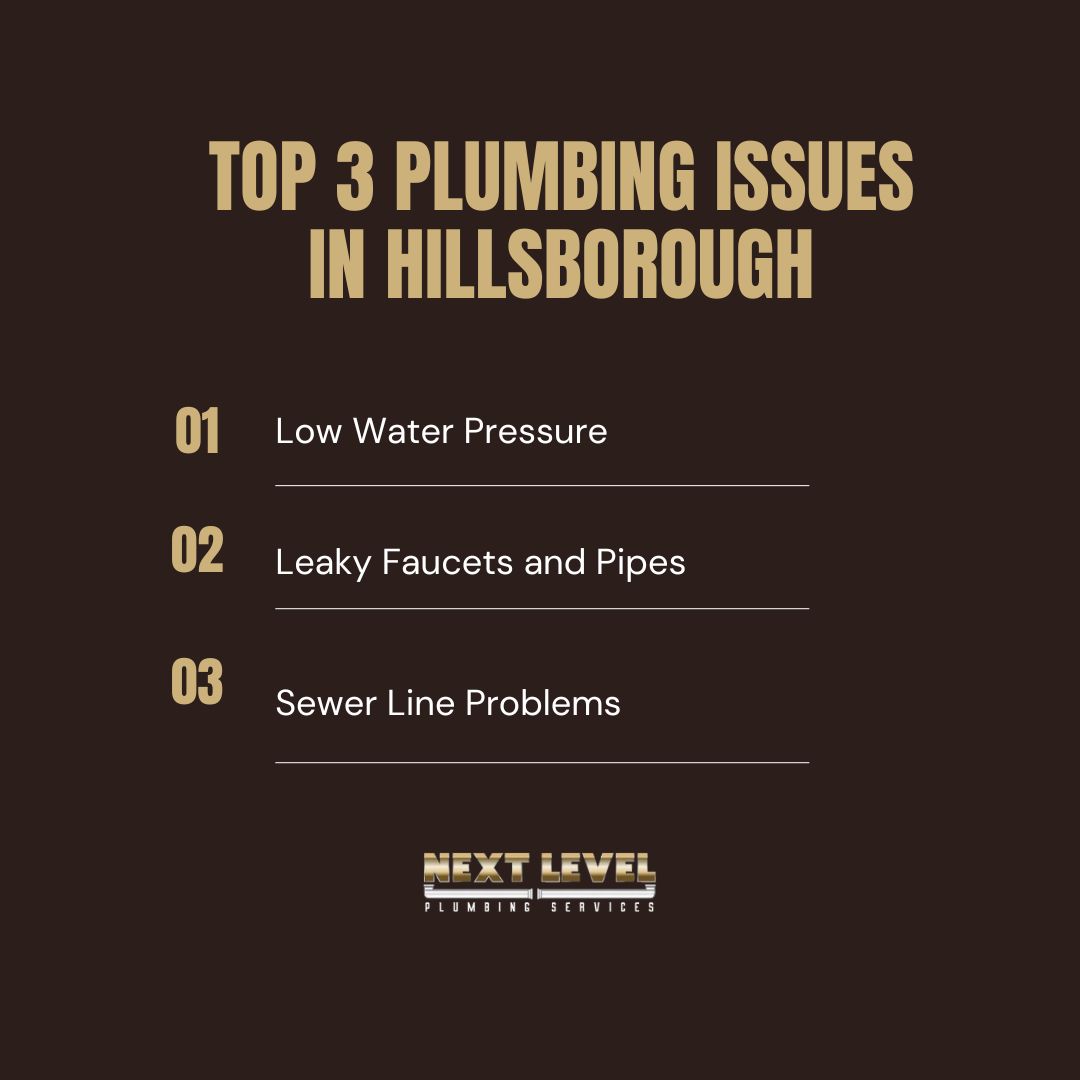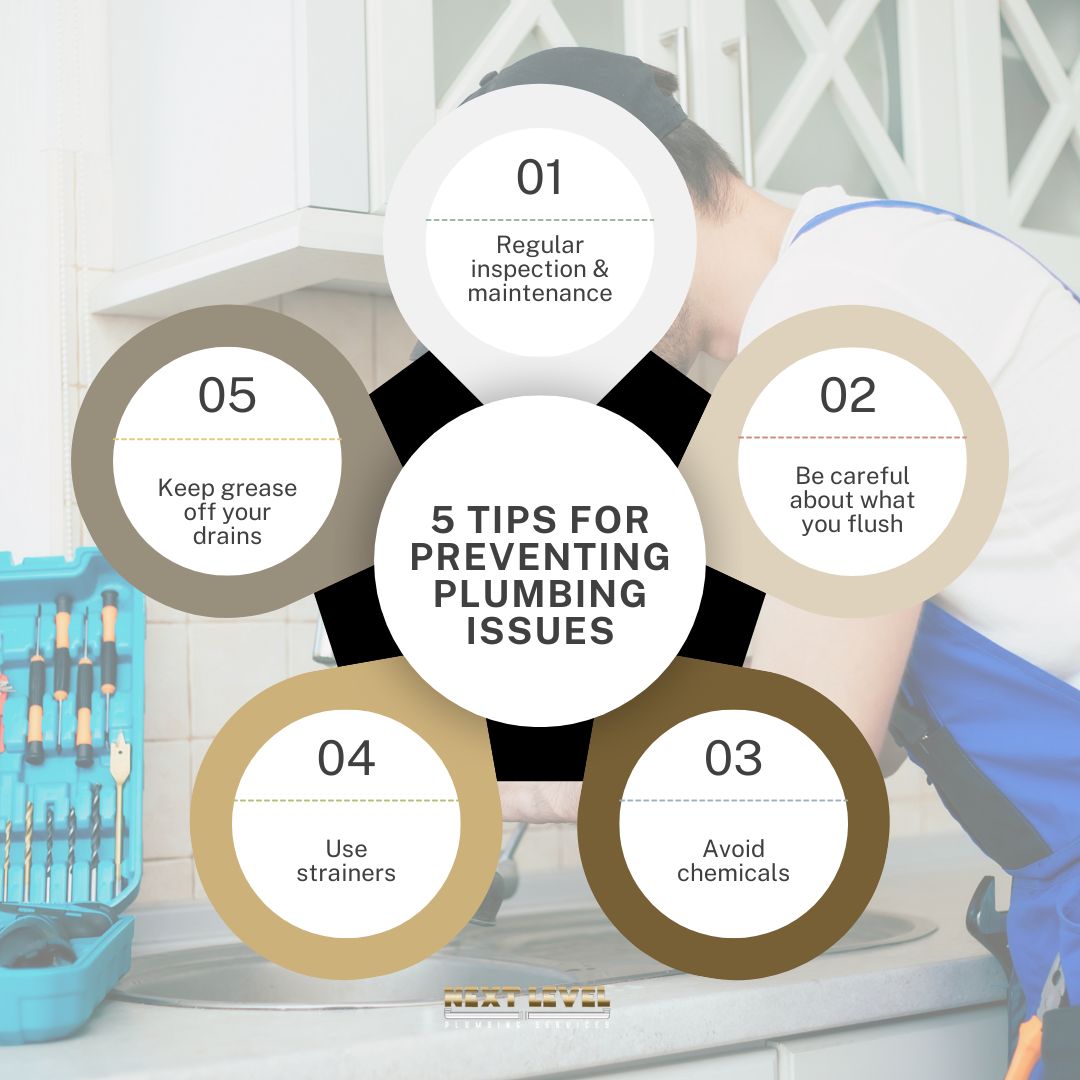Plumbing issues are frequent among homeowners worldwide, and Hillsborough is no exception. However, the town faces unique plumbing challenges because it has many older homes and substantial buildings.
This article covers popular Hillsborough plumbing issues, their causes, solutions, and practical tips for preventing plumbing challenges. Let’s dive in.
Table of Contents
- Overview of Hillsborough’s Plumbing Landscape
- Top Plumbing Issues in Hillsborough
- 5 Tips for Preventing Plumbing Issues
Overview of Hillsborough’s Plumbing Landscape
Aside from its rich, vibrant culture, Hillsborough is known for its historic mansions and bungalow-style homes built in the 1930s and 1940s. Dripping faucets, running toilets, and clogged pipes are common issues with older homes, as aging properties often have old pipes that cause plumbing issues.
Additionally, Hillsborough’s minimum house size requirement is 2,500 square feet. While this is a perfect size for medium—to large-sized families, larger homes have a vast piping network, which is likely to cause water pressure problems. Let’s explore common Hillsborough plumbing problems more below.
Top Plumbing Issues in Hillsborough
Some of the most common plumbing problems in Hillsborough are below:

1. Low Water Pressure
A common problem among Hillsborough residents is low water pressure. Low water pressure occurs when there’s weak water flow from showerheads, toilets, dishwashers, sinks, washing machines, or bathtubs.
Whether it happens abruptly or gradually, low water pressure can stop household activities, including showering, doing laundry, rinsing, and cooking. Further, a significant pressure drop can cause contamination as water moves in the opposite direction (backflows) and various serious water flow issues.
Although pressure issues often cause plumbing nightmares in older homes, they can also affect new homes. To fix low water pressure in Hillsborough, you must understand its root cause.
Here are the major causes of low water pressure and solutions:
Pipes/fittings leaks
A leaking pipe may cause pressure to drop in your taps or faucets. Constant leaks divert your water’s path, ultimately weakening water pressure.
Solution: Turn off the faucets and check for water puddles and wetness beneath your pipes. Once you identify the problem, resolve the leak by repairing or replacing any corroded pipes.
Clogged Pipes
Water can’t move freely if you have clogged pipes. Clogs result from the build-up of minerals, silt, lime scale, and residue over time. They may affect one faucet or more throughout your house.
Solution: Inspect your pipes for clogs or request a licensed plumber to inspect them and clear any clogs obstructing your home’s water flow.
Corrosion
Older homes’ plumbing systems are likely decades old. Most owners of Hillsborough’s older homes used galvanized steel for piping. While it was a durable option, experts warn that galvanized steel lines wear out after 20-50 years due to constant corrosion, causing leaks and low water pressure.
Solution: With the help of a professional plumber, replace aging pipes with newer, better types.
Faulty Fixtures
Your home’s fixtures, including showerheads, sinks, and dishwashers, wear out due to the constant build-up of lime, silt, minerals, residue, and dirt, which restrict water flow.
Solution: To clear clogs, remove parts of your faucet aerator or showerhead and clean each separately with a toothbrush. Alternatively, unscrew your showerhead or faucet and soak them overnight in a concentrated vinegar solution to loosen build-up.
2. Leaky Faucets and Pipes

Leaky faucets and pipes are popular plumbing nightmares in older and new homes. A dripping faucet or pipe is not only a nuisance but also significantly increases your water bill.
Leaks start as slow drips and eventually turn into expensive plumbing disasters if you don’t take quick action to fix leaky pipes. According to the U.S. Environmental Protection Agency (EPA), a leaky faucet dripping at one drip per second can waste over 3,000 gallons yearly.
The causes of leaky faucets and pipes are below:
Worn-out O-rings
O-rings are small discs that hold up your faucet’s handle. O-rings seal your taps, preventing unnecessary leaks.
With frequent use, O-rings experience wear out and get loose, causing your faucet to drip, especially near the handle. This is often common with cartridge faucets.
Solution: Replace your O-rings yourself or with the help of a licensed plumber.
Defective Washers
Washer issues are among the most common causes of leaky faucets. Every time you use your faucets, the washer repetitively presses against the valve seat, causing friction.
This friction, excessive water pressure, and movement wear out the washer, resulting in water drips, especially for compression faucets.
Solution: Replace the worn-out washer with a new, functional one to resolve leaks.
Valve Seat Corrosion
The valve seat could be corroded if your faucet leaks from its spout. Valves are the link between the faucet and the spout. When sediments, residue, minerals, and silt accumulate over time, they cause rust and corrosion on the valve seat, leading to a leaking faucet spout.
Solution: Contact plumbing maintenance Hillsborough professionals for valve seat cleaning services.
High Water Pressure
Water drips at particular times of the day. Such leaks are mostly caused by excessively high water pressure hitting your pipes hard, causing them to burst or break.
Solution: Talk to your water provider to reduce the pressure. Contact your plumber for pipe repair and replacement.
3. Sewer Line Problems
Hillsborough residents often struggle with frequent sewer backup issues due to its historic older homes and large house sizes that come with an extensive piping network. Aside from being a serious problem that can damage your property extensively, a sewer line backup poses a risk of contamination.
When wastewater doesn’t flow properly through your plumbing system, toilets, sinks, and drains back up, wreaking havoc. Sewer line issues occur when obstructions block or breach the waste line.
The causes of sewer line problems are as follows:
- Blocked pipes: Like other drains in your home, the main sewer line is also prone to blockages. Since it’s meant for wastewater and tissue papers, flushing other items like sanitary pads, grease, hair, or soap down the drain creates backups.
- Tree roots: As trees grow, they spread their roots above or around your pipes, causing them to break. Roots from other trees infiltrate such pipe cracks, leading to blockages and sewer line backups.
- Old/aging sewer lines: Older sewer pipes are weak and more likely to break or collapse. Many Hillsborough older homes have sewer lines made of materials prone to degradation, including clay and cast iron. Such aging infrastructure leads to sewer line backups.
To prevent a full-blown sewer line issue, look for signs, including foul odor, slow drains, water backups, and gurgling sounds. Contact a sewer repair Hillsborough area plumber for timely diagnosis and resolution of sewer line backups.
5 Tips for Preventing Plumbing Issues
Here’s how to prevent plumbing problems:
- Regular inspection and maintenance: Inspect your drains regularly or hire a professional plumber to check for leaks, corrosion, and drips in your pipes. Regular plumbing maintenance promotes plumbing health and prevents emergencies.
- Be careful about what you flush: This is among the most practical home plumbing tips. Do not put anything that’s not soluble in water down the drain, including wipes, hair, egg shells, paper towels, egg shells, food particles, and sanitary pads.
- Avoid chemicals: Use safe, natural, eco-friendly drain cleaners because harsh chemicals corrode and damage pipes.
- Use strainers: to prevent debris that causes faucet blockages, use sink and bathtub strainers.
- Keep grease off your drains: Avoid pouring grease or liquid fats down your drains to keep your drains from build-ups that cause pipe blockages and backups.
For a healthy plumbing system, trust your plumber as you’d trust your doctor. Our team of professional, experienced plumbers provides personalized services for your unique plumbing needs. We resolve plumbing problems in Hillsborough and beyond.

